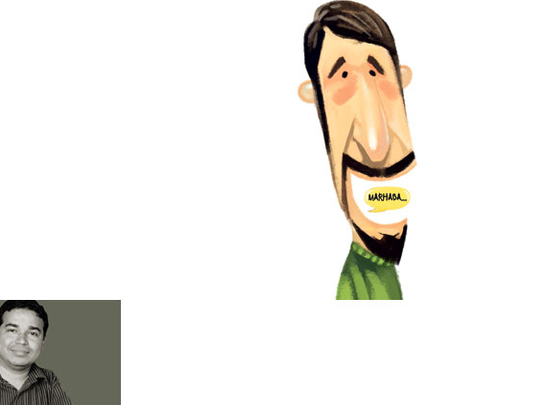
Language is perhaps the most precious, most beautiful gift after intellect that God granted man. In fact, language is the medium of expression of our intellect. Language is perhaps the most significant invention of our ancestors, even more important than the wheel that was invented nearly 6,000 years ago in ancient Iraq and is considered the beginning of human civilisation. For the wheel couldn't have come about without man's ability to think and express himself.
Languages have always and endlessly fascinated me. How they come into being, how they evolve with their speakers and how they relate to each other. How babies form pictures of people, things and places in their embryonic minds and express them in incomprehensible sounds is an endlessly fascinating process. Those incomprehensible sounds though must have formed building blocks of our languages.
One of the first things I wanted to do after landing in Dubai, besides buying my own car, was to learn Arabic. But it's one of those pious resolutions that are easy to make and hard to follow for one reason or another.
Still, having lived and worked in the Gulf for so many years, it's a real shame if our understanding of the Arabs doesn't go beyond shawarma (Arabic sandwich wrap), shisha (hubble-bubble or hookah) and shopping malls.
The trouble is, you could live and work in the UAE for years and decades without ever bothering or requiring to learn the local language. Which is what most expatriates do. They live, work and move all their lives in limited spheres of their own communities without ever trying to understand the host country or society.
That is no excuse for not learning Arabic though. So when an opportunity to do so presented itself recently, I gratefully grabbed it. Given the lazy hours of my current job, I couldn't have hoped for a better chance to quench a lifelong thirst for the glorious language that the Arabs believe — and many linguists agree — to be the mother of all languages.
The past couple of months learning the basics of Arabic with the help of my irrepressibly cheerful Egyptian teacher have been an enriching experience. In a class of 40, most ‘students' are from Europe and increasingly remind me of that classic BBC comedy, Mind Your Language. And it's immensely instructive to see Europeans go to great pains to master a language that is so different from theirs.
Different shades
I kind of believed I had a thing for languages and convinced myself that picking up Arabic would be as easy as learning English or Urdu. Especially when I am already familiar with the Arabic script, the language of the Quran, as most Muslims are. Besides, my mother tongue, Urdu, is based on the same script and is heavily indebted to Arabic, just as it is to Persian and Sanskrit, in terms of vocabulary. So I thought I could pick up Arabic in no time, if not master it. Boy, was I wrong!
Arabic is not just an ancient, rich language, it is easily the most complex and nuanced one I've ever come across. Every new lesson has been humbling, illuminating the distant boundaries of my infinite ignorance.
Unlike in English, in Arabic every object and everything, living or inanimate, has a gender and sentences are formed accordingly. The whole sentence structure changes with each pronoun and helping verb.
More important, the written and spoken Arabic are totally different species. It's not just the dialect that changes from region to region but words acquire totally different shades of meaning and interpretation.
Then there's its rich repertoire of vocabulary built and accumulated over thousands of years in a region that has been the cradle of world civilization. No other language, with the exception of Sanskrit perhaps, can boast of a literary heritage as great as that of Arabic. The Arabic language and literature have directly or indirectly contributed to all great literature in languages around the world.
It is a shame then like so many great languages from the East, Arabic has been in a steady decline. As much as I love Queen's English, I have to say this: The growth of English as global lingua franca has come at the expense of great languages like Arabic.
Thanks to the ascendency of Western civilisation and Mac cultural invasion, more and more people are abandoning their ancestral languages for English.
As a result, ancient languages have been dying at an unprecedented rate. Indeed, we may be living in a century that could prove decisive for the future of hundreds of languages. It's feared that by the end of this century or the next, seven thousand of world's languages could be reduced to just about 600.
It's all the more alarming in ancient societies of Asia, Latin America and Africa. In America, most languages of native Indians, its original inhabitants, are already dead. Last year, with the death of Boa Senior in India's Andaman Islands, the last surviving speaker of Bo, one of Asia's oldest languages, died an unwept death. And there are many others out there that face a similar fate.
Languages are part of our collective heritage and a testament to and chronicle of mankind's long journey. They must not be allowed to die, especially not by those who have inherited it and are born with it. Especially not a divine language like Arabic.
Aijaz Zaka Syed is a widely published commentator. Follow him on twitter/aijazzakasyed.










